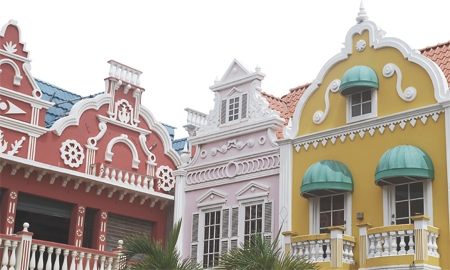“Having traveled to most of the islands in the Caribbean, I think there is a difference when we talk about the hospitality of the people here,” she says. “The Aruban hospitality is truly genuine and we mean it. I also think that the quality of the product is very strong, and that that is a differentiating factor. Our quality also stands for consistency and reliability. Aruba scores very high in terms of both value for money and overall experiences.”
With a suspension on construction of new hotels, Aruba is now focusing on improvements; over $1 billion is being invested through the Tourism Product Enhancement Fund in beautifying and developing already excellent infrastructure, from the restoration of monuments and a 10-mile long waterfront park to the airport and a new tram system. Eco-tourism has been identified as a strong suit worth pursuing, and already some 20% of Aruba’s land is protected as part of the Arikok National Park.
The natural beauty and warm hospitality are complemented by Aruba’s cultural diversity. With more than 90 nationalities inhabiting the island, Aruba serves as a type of cultural bridge that unites the Caribbean, North and South America, and Europe.
The economic recession took a toll on the Caribbean tourism industry, yet Aruba’s allure and marketing strategies successfully kept figures in the black throughout. In the first six months of 2008, Aruba enjoyed strong results for occupancy and REVPAR (revenue per average room); however, in the second half of the year through 2010, it only managed to stay flat or achieve small growth figures, says Ms. Tjin Asjoe-Croes.
“We realized that we had to invest more during this time in order to generate at least the same business, or something extra. It was very tough, but Aruba managed to do that.”
The privatization of ATA in 2011 has been a savvy move towards further boosting tourism. According to the CEO, it allows for the marketing organization to “be able to function independently, react fast and allow for Aruba’s marketing to be conducted in an efficient, timely and innovative manner.”
For Otmar Oduber, Minister of Tourism, Transportation and Labor, converting the former government agency into a kind of public private partnership allows the public and private
sector to move forward hand-in-hand. “We believe it is very important to make sure that the private sector knows exactly what the government is doing as well as keeping them on board in terms of the strategies that we’re using. The focus was on putting Aruba two steps ahead of other competitors in the Caribbean, not just with infrastructure, but also on the service and hospitality side,” he says.
Also keeping Aruba “two steps ahead” is the belief and confidence in young professionals coming on board. “Many of the island’s ministers are rather young and with strong professional backgrounds and this is also the case of ATA. There is a fresh perspective, combined with a lot of hard work and dedication in order for the island to be ‘two steps ahead’,” says Ms. Tjin Asjoe-Croes.
For ATA, the next several years will see a focus on sustainable development of high quality, as opposed to a strategy of mass development. “Tourism will remain the pillar of the economy and we must ensure that our visitors return with a sense of over-satisfaction and that they become our ambassadors who spread the message about our beautiful and ‘dushi’ (sweet) Aruba,” says the CEO.
Mr. Oduber agrees: “This is one happy island, where we just want you to be as happy as we are.”
0 COMMENTS